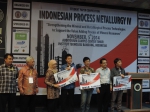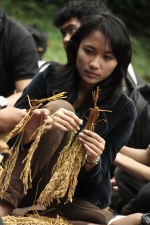ITB Students Develop Sakola Kembara to Provide Free Education for Village Children
By Adi Permana
Editor Adi Permana

BANDUNG, itb.ac.id—Being a student means bearing the responsibility to contribute to society. Rommi Adany Putra Afauly, a student of ITB's Mechanical Engineering Study Program, with his colleagues had been developing an educational facility that can be accessed by village children for free. This educational center was aptly named Sakola Kembara, comprising the words "sakola" meaning "school" and "kembara" meaning "to journey" in Sundanese.
Rommi revealed his team's struggle in developing Sakola Kembara, an informal school with a specific aim in mind: to encourage children across Indonesia to venture out from their villages to pursue education. He explained that Sakola Kembara's inception began when he was appointed the Chief of the Collaboration and Implementation Division at Gebrak Indonesia to build Cinta Asih Village. The given mandate, accompanied by his own personal dissatisfaction with Indonesia's educational inequality, ignited Rommi's spirit to prosper education in villages.
With his newfound objective, Rommi invited his friends at Gebrak Indonesia to relieve the student-resident relationship in Cinta Asih Village, which had diminished due to the Covid-19 pandemic. According to Rommi, it was excruciating to live in the village for six months because he and his friends still had to attend online lectures. They had to endure the occasional internet instability and power outages that occurred every single night during the timeframe.
Rommi was also motivated by his parents, who wanted to see their children complete the highest educational level possible, even though both of them only managed to graduate from junior and junior high school. As a member of a Sumatrean family who had settled in Jakarta, Rommi unveiled the journey was not easy.
At the time, he read a journal published by the Organisation for Economic Co-operation and Development (OECD) that was titled "Starting Unequal: How's Life for Disadvantaged Children?". Through it, Rommi learned that a child's cognitive ability could be affected by their parents' prosperity. He learned this very phenomenon when he was at school in Jakarta. Nevertheless, Rommi was still grateful for his situation, in which he was exposed to adequate education despite his family's unstable economy.
The unfortunate reality of education in Indonesia motivated Rommi to reduce the gap in quality between cities and villages. Since his first year in university, he had been teaching children in remote areas of Bandung. With this teaching experience, Rommi conceptualized how to build a village with the help of his friends. By optimizing the funds provided by ITB, Rommi and his team began conducting roadshows to five schools in Cinta Asih Village. They offered free tutoring for third-year high school students to prepare them for university. However, the results were unsatisfactory. "At that time, only two students registered, and they were second-years," Rommi stated.

A series of arduous discussions was taken to determine how the plan would be executed on site. Cililin Subdistrict, a subdistrict in West Bandung Regency located closer to the city, gave a ray of hope for the team. Based on the discussions, they decided to split into two smaller teams: one team was to remain in Cinta Asih Village and the other was to go to Cililin Subdistrict. It turned out that they made the right decision as they successfully sent 11 out of 16 students from Islamic State High School of Cililin to state universities.

Rommi revealed that learning and teaching activities at Sakola Kembara were still ongoing. These activities were conducted every Saturday morning to Sunday afternoon. The teachers at Sakola Kembara themselves were volunteers of students from various educational institutes, namely Institut Teknologi Bandung, Institut Pertanian Bogor, Universitas Pendidikan Indonesia, Universitas Padjadjaran, and STKIP Siliwangi. Additionally, the teaching team also consisted of several non-student volunteers.
Besides organizing educational activities, Sakola Kembara conducted mentoring activities as well. These mentoring sessions were not focused solely on academic matters. "We position ourselves as facilitators, or 'big brothers and sisters'. We are not teachers, but more like older siblings who are here to help them because that's what they need. The main key to learning lies within themselves," elaborated Rommi. Moreover, the teaching team occasionally visited the students' parents to help ensure the achievement of their goals.
Rommi and his team were thankful for the material as well as moral support from various parties, from which Sakola Kembara continued to flourish. According to Rommi, Sakola Kembara was a form of criticism towards the government materializing from the equality of education in Indonesia. "As long as Sakola Kembara exists, the quality of education is not satisfactory," declared Rommi.
Rommi hoped that Sakola Kembara could invigorate others who wanted to ameliorate the quality of education in remote and underdeveloped areas. He himself had a grand ambition of establishing a school with an international curriculum specifically for village children.
Rommi advised ITB students to fully take advantage of the opportunities at ITB to help build the nation together. Not only that, society as a whole must be committed to advancing the nation to the best of its ability. According to Rommy, this opportunity was not a gift given by God for free, but rather an act of responsibility to our country.
Reporter: Hanan Fadhilah Ramadhani (Civil Engineering '19)
Translator: Ariq Ramadhan Teruna (Chemical Engineering '21)

.jpg)
.png)
.jpg)
.jpg)
.jpg)


